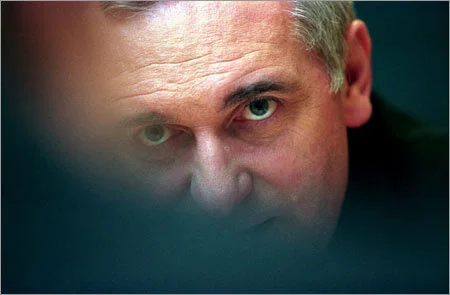Products Of A Corrupt System
With all of the furore surrounding recent developments at the Mahon Tribunal in Dublin the question has to be asked as to what has actually been achieved after 10 years of the Tribunal’s existence.
The Mahon Tribunal was established in November 1997 with the benign sounding purpose of inquiring into “certain planning matters and payments”.
Since that date, the Tribunal has worked both in private and in public session. And it is these public sessions which have attracted the most media attention – most particularly when revelations, or allegations, relating to well known individuals are made. The levels of media, and public, interest in the work of the Tribunal reached new highs with the recent appearance of Twenty-Six County Taoiseach Bertie Ahern.
To summarise, Ahern is under investigation over a number of large cash payments that he received from a coterie of wealthy businessmen during the early to mid-1990s – during part of which time he served as a minister of finance in the Twenty-Six County administration.
Ahern freely admits that he received these ‘donations’ but claims that they were gifts from friends who were concerned about his financial situation following the break-up of his marriage.
The Tribunal is not convinced. The, as yet, unspoken suggestion is that Ahern received monetary recompense for political favours done for these businessmen. It is this possibility that has been the focus of the Tribunal’s investigation and, in the process, it is attempting to determine exactly how much money Ahern received, when he received it and who gave it to him.
What is not under investigation is the financial or moral propriety of a politician of Berite Ahern’s prominence accepting massive financial gifts for ‘personal reasons’ - most particularly in pre ‘Celtic Tiger’ Ireland, where the majority of the population were experiencing very real economic hardship.
What is not under investigation is the question of whether it was, or is, appropriate for a minister for finance to build, or maintain, close relationships with a golden circle of wealthy business people – people with deep pockets and a deep vested interest in the fiscal policies adopted by that same minister.
And of course these issues shouldn’t be under investigation. Not under the current terms of reference of the Mahon Tribunal that is – terms which allow investigation into individual incidents of financial corruption in the form of proven bribes, but prohibits investigation into a culture of moral and political corruption in the form of the symbiotic relationship between the business and political class.
Instead, the Irish public are treated to a steady stream of commentary on the attire worn by Ahern’s former partner, Celia Larkin, during her appearances at the Tribunal and are befuddled by the arguments over what currency was lodged in what bank, at what time and by whom.
Two out of the last four Twenty-Six County Taoisigh, Charlie Haughey and Ahern, have been seriously dogged, if not totally blackened, by allegations of corruption.
Yet it has not occurred to the mainstream media and the assorted tribunals, even with their limited remits, that this state of affairs calls into question the very system of government in this part of Ireland.
It is so because it is generally accepted by the media moguls, and their scribes and mouthpieces, that those in the most senior governmental posts will be friends of the business class and their interests. If the ministers and the businessmen, in their enthusiasm, step over the legal line every once in a while this is to be regretted, but it must not be used to question the modus operandi of the whole system.
It might not be currently fashionable to say so, but our politicians are corrupt because this state is corrupt. It is a state that was born out of an aborted revolution and a vicious counter-revolution.
It is a state that placed all the gombeen landowners and rackrenting landlords who supported British imperialism, by deed if not word, into power on its inception.
It is a state that directly mimicked its overlord when it immediately put into place the legislative and parliamentary framework of capitalist Britain.
Corruption is nothing new in Irish politics – it is a disease that has been rampant for hundreds of years. It is a disease that is directly attributable to the parliamentary and legislative framework which we, the people of Ireland, have suffered under for the same length of time.
This framework is designed to protect the vested interests of the rich and powerful. All the safeguards and tribunals in the world can’t, and won’t, change that fact.
The wealthy in this state have been well protected over the last 90 years by politicians they have in their pay. If we are to challenge that wealthy elite, and the damage they are doing to the welfare of the nation, we must take a fresh and critical look at the institutions where the politicians ply their trade.

